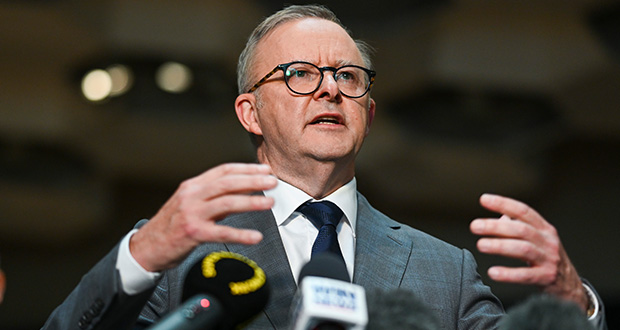PM defends nursing mandate as more homes close

Australia's Prime Minister has stood firm on his 'ambitious' approach to aged care after a Perth-based provider announced it will shut three of its 12 residential homes by 2024.
Brightwater Care Group told ABC it faced severe financial and staffing pressures ahead of the new national standards around 24/7 onsite nurses.
From July 2023, all aged care homes will need to have a registered nurse present at all times.
Prime Minister Anthony Albanese said the government's 'ambitious' staffing requirements were necessary to improve aged care following the Royal Commission's recommendations.
"The fact that 90 per cent have met the (staffing) requirements already shows that we make no apologies for being ambitious in this area," Mr Albanese said.
"But we're also being very practical about the way that these issues are dealt with."
Federal data estimated that 80 per cent of facilities already met the 24/7 nursing requirements, and 'nine per cent were very close.'
Yet, increasingly more providers are announcing home closures as staffing pressures rise ahead of the July deadline.
Brightwater said it would close three of its smallest and older residential aged care facilities over the coming 12 months.
Brightwater chief, Catherine Stoddart, said the age and size of the facilities and the increasing care needs of its residents played a significant role in the decision.
"Modelling of our rosters to meet the new minimum staffing requirements showed that our smallest facilities would not be best placed to deliver the quality of care in a financially sustainable way," Mrs Stoddart said.
"On behalf of all families and residents who call Brightwater home, we have a responsibility to ensure the long-term delivery of high quality care and ensure the sustainability our business."
Roughly 75 residents living across the three facilities in Joondalup, Huntingdale and South Lake will need to relocate.
Over 160 staff will also be offered new positions in Brightwater's other aged care facilities.
Earlier this year, Brightwater opened a new 128-bed facility at Inglewood where some of the staff and residents are expected to relocate to.
“We're committed to ensuring the safety and care of our residents and to the long-term sustainability of our aged care facilities," Mrs Stoddart said.
"Decisions like this are not easy, however, it is critical for the ongoing delivery of our business."
The government reiterated that providers failing to meet the new mandates by July would not need to close their doors and that it 'would work closely with them to get the support they need.'
Earlier this year, Victoria-based aged care provider VincentCare withdrew from Home Care Packages, citing difficulties meeting new government requirements.
Sydney-based aged care provider Wesley Mission announced last week it would close its remaining three residential homes due to staffing challenges.
The move is expected to impact 200 residents and 2,000 staff.
Aged care minister Anika Wells took to social media to defend the government's decision to mandate staffing levels.
"I will not apologise for being ambitious to improve the quality of aged care," Wells wrote on Twitter.
"Providers making genuine efforts to follow the rules and keep their residents safe should not be concerned."
The Albanese government conceded in March the nursing deadline would be unachievable given widespread staffing shortages.
It said that facilities unable to meet the 2/47 nursing requirements, such as those in regional areas with less than 30 beds, would be exempt from the mandate.
Shadow aged care minister Anne Ruston said the government was 'blatantly ignoring' workforce shortages.
"Labor has broken its headline election promise to older Australians, and aged care homes are now closing under his watch," Mrs Ruston said.
100 more flexible aged care places in regional Australia
The Department of Health has announced it will open up 100 additional flexible aged care places across regional and remote Australia.
Last Friday, Mrs Wells said it would 'increase its support' for older Australians by extending places within the federal Multi-Purpose Services (MPS) scheme.
MPS is an aged care services program older Australians living in rural areas can access.
These locations are often the only aged care services available to remote communities.
Currently, 3,739 flexible aged care spots are available in Australia, provided by 28 MPS providers across 180 sites.
From Friday onwards, eligible aged care providers in any state or territory can request up to 100 new flexible places.
"Adding 100 more MPS places gives older people in rural regions the peace of mind that they'll be able to be cared for in their own community," Wells said.
Email: [email protected]






I wish the opposition stopped blaming the Albanese government for trying to improve aged care.
Having recently lost my parent in an aged care facility, I can definitely say that having an RN on every shift is imperative for good care for the residents.
The push to have a Registered Nurse on every shift has now resulted in some aged care providers to make the EEN role redundant or forcing EEN’s to work in the role of a PCA as some facilities are employing more than one RN per shift . Depending on the size of the facility This can result in up to between 7-10 RNS at the one time . The wage difference between a RN and EEN will really impact the age care sector resulting in more closures
Given the increasing age of the population, the increase in older people remaining at home for a longer period with Home care, together with the increasing complexity of care needs, it is extremely important that Government continue down the path of requiring increased professional skills in staff, who are charged with the very important role of care delivery.
This should also include the Managers who should be required to have Specialist Nursing Management qualifications. One would not expect a Nurse to be competent to manage a Mining Company & so it follows that Managers, who might be expert in the Business arena, are not necessarily competent to manage an Aged Care Facility.
Prior to the changes in Government Policy in 1997, Aged Care Facilities were staffed by highly skilled Registered Nurses, highly valued Enrolled Nurses & experienced Assistants in Nursing. All Managers were required to have appropriate Nursing Management qualifications. Some forward thinking Facilities also ran Enrolled Nurse training schools in partnership with a local Hospital. The result of this process was that staff were highly motivated & interested in the specialty of Aged Care & extremely high quality care was delivered ALL the time!!!!!!
We indeed need to return to some of the great things of the past ……..& endeavour to retrieve some of those things we threw out……..
I can only encourage the Government in it’s push to reverse the appalling issues caused after the Policy changes of 1997. Those of us managing Aged care Facilities at the time predicted this disaster which has unfortunately come to pass …….
Prior to 1997, ALL Aged Care Facilities were staffed by highly skilled Registered Nurses, highly valued Enrolled Nurses & experienced Assistants in Nursing.
‘Gerontic Nursing’ was a specialty qualification which most of the Nursing Managers of Facilities had acquired.
Some Aged care Facilities even ran Enrolled Nurse Training Schools in partnership with the local Hospital !!
It was recognised that care of older people required special skills, as needs became much more complex due to increasing age & ability & as residents tended to remain in their homes for longer, with increased Home Care packages available. What has been forgotten is that much more is required to deliver care than the “pie in the sky” idea of a “homelike” environment – whatever that was supposed to look like……..
It has been forgotten that high quality care requires high quality skills & knowledge – not just “compassion & commitment” …..Unfortunately, along the way, other changes occurred significantly in the way Nurses are trained & this has added to the enormous issues we are currently facing in gaining & retaining the qualified staff required.
We can only hope that somehow, we can retrieve some of the excellence which existed in the past to re-establish in the future ……